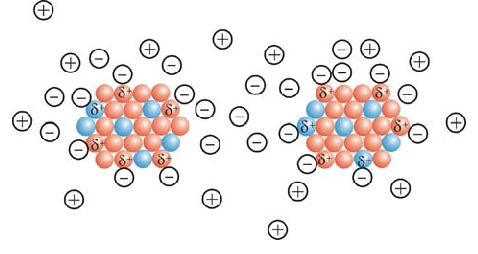(nuclear power)
Nuclear electricity - Uranium enrichment for electricity production is a process by which (uranium isotope 235U) is used for electrical energy.
Researcher and author: Dr. ( Afshin Rashid)
Note: Uranium enrichment for the production of electricity is a practice that increases the amount of 235U isotope and decreases the amount of 238U isotope in a mass of natural uranium. Uranium enrichment is one of the steps in the nuclear fuel cycle. Natural uranium (which is in the form of uranium oxide) contains 99.3% of the isotope 238U and 0.7% of 235U. Uranium isotope 235U is fissile and suitable for nuclear power generation and nuclear power plants.
Nuclear fission is a process in which a heavy atom such as uranium is converted into two lighter atoms. When a nucleus with a high atomic number is split, some of its mass is converted into energy. This energy is used in the production of electricity (in a nuclear power plant) or destruction (nuclear). The nuclear fission process requires neutron bombardment; That is, to slow down the neutron whose speed is (almost) equal to the speed of light by using methods such as using heavy or light water, so that the atom will disintegrate after the atom's nucleus is destabilized. (In uranium, after the decomposition of barium and krypton elements, 2 or 3 neutrons are returned) Ottohan, when he intended to bombard uranium with neutrons to convert it into radium, found that he had obtained a much smaller atom.
The product of this neutron bombardment is barium, and the mass of each uranium atom when it is converted into smaller particles is reduced to one-fifth of the mass of a proton, which after the impact of a neutron turns into the uranium-236 isotope and quickly disintegrates and radio rays Active emits. Then barium-141 and krypton-92 decays into lanthanum-141 and lanthanum-141 and cerium-141 are divided into praseodymium-141 and becomes stable and krypton-92 decays into rubidium-92 and Rubidium-92 reaches strontium-92 and strontium to yttrium-92 and yttrium to zirconium-92 and becomes stable. At the same time, it releases 2.5 more neutrons, each of which causes the fission of another uranium nucleus, and this chain reaction continues regularly.
In nuclear power, the chain reaction continues without control to produce the most energy possible at the moment. During this chain reaction that occurs within a few millionths of seconds, the number of nuclear fission events increases rapidly. In nuclear reactors, the speed of neutrons is reduced by using retarders to control the chain reaction.
Conclusion:
Uranium enrichment for the production of electricity is a process by which the amount of 235U isotope in a mass of natural uranium is increased and the amount of isotope 238U is decreased. Uranium enrichment is one of the steps in the nuclear fuel cycle. Natural uranium (which is in the form of uranium oxide) contains 99.3% of the isotope 238U and 0.7% of 235U. Uranium isotope 235U is fissile and suitable for nuclear power generation and nuclear power plants.
Researcher and author: Dr. ( Afshin Rashid)
Specialized doctorate in nano-microelectronics







